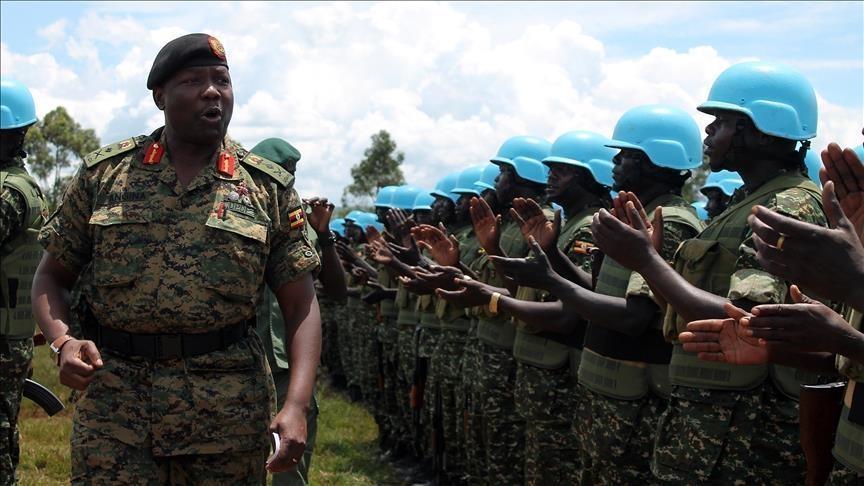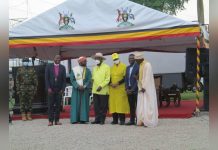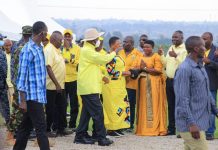Faridah N Kulumba
Africa-Press – Uganda. The president of Uganda Yoweri Kaguta Museveni while addressing the nation recently said that the Uganda People’s Defence Forces (UPDF) operating in the Democratic Republic of Congo (DRC) has killed more than 560 members of the Allied Democratic Forces, (ADF), a group allied with Islamic State militants.
The ADF is based in the jungles in the east of the neighboring Democratic Republic of Congo from where it launches attacks within Congo and Uganda.
On 30 November 2021, Uganda and DR Congo launched a joint operation dubbed ‘Operation Shujaa’ against the ADF armed group. Hundreds of Ugandan soldiers and dozens of armored vehicles have been seen crossing the border at Nobili since the offensive started.
President Museveni also said he has asked the Armed Forces of DR Congo (FARDC) to deploy local militia to stop the ADF, a move analysts warned will only cause more trouble.
The joint operation’s success
Ugandan head of state revealed that since the joint operation, Shujaa was launched by the two neighboring countries 567 ADF rebels have been killed.
According to President Museveni, fifty terrorists were captured alive, and 32 surrendered, he said. Several ammunition depots were recovered. The submachine guns and rocket-propelled grenades were among 167 pieces of equipment retrieved from the rebels.
After the government of Uganda secured permission, from DRC President Felix Tshisekedi, Museveni said, the Ugandan army cleared the Rwenzori mountains of ADF rebels. Most of the militants have been pushed toward Mombasa, in the Ituri province, he said.
In August this year, top officers from the UPDF issued a statement saying that they had killed one of the ADF militia commanders who was identified by only one name, Fazul, a Tanzanian national who had been mainly operating in Mwalika valley in eastern DR Congo’s North Kivu province.
DRC’s fear of ADF retaliation
Museveni said, he learned in a recent meeting with Christian Tshiwewe Songhesha, the commander of the armed forces of the DR Congo, that the ADF is capable of returning to some areas and causing trouble.
But President Museveni promised that the Ugandan defense forces would work with the FARDC to deploy local defense units in villages to help prevent further attacks by the ADF.
How Uganda is planning to prevent attacks
According to Museveni, Uganda’s mobile forces would hunt terrorists, zonal forces would stay in the area and the local militia would guard the villages.
He explained that there is a need for a local force to remain in action to make sure that the ADF militants don’t come back. Museveni assured that both nations have the capacity to ensure that no force hostile to the government of Congo or Uganda can congregate anywhere and survive.
ADF attacks on Uganda
In June this year, the ADF rebels attacked Uganda. They killed 41 people, including 37 students who were burned, shot, or hacked to death with machetes in a sickening attack on Mpondwe-Lhubiriha School in Kasese District, about 1.2 miles from the DRC border.
An unknown number of people were abducted by the rebels, who fled across the porous border into Congo after the raid.
Uganda blamed the ADF for a triple suicide bombing in its capital Kampala on 16 November 2021, which killed seven people, including the bombers.
In July 2010, 74 people were killed, and dozens were injured when suicide bombers detonated explosives while people were watching World Cup matches on television at two locations in Kampala.
In July, the British government issued an advisory saying the threat of terrorist attacks remains in Uganda and throughout the region. The U.S. Mission in Uganda has since June warned its nationals of possible attacks, especially within Kampala, even though they may not target foreigners.
How Ugandan forces recovered explosives in Kampala bomb plot recently
At the beginning of this month, Uganda police recovered six improvised bombs around the capital Kampala in two days from a plot linked to an Islamist rebel group.
The discovery came a day after a man attempted to enter a church with a bomb in his bag. Police arrested a 28-year-old man identified as Ibrahim Kintu as he was entering Rubaga Miracle Centre Pentecostal Church with a deadly bomb in his bag.
Following his interrogation, he revealed a plot involving six terrorists and led the police to a rented house where more bombs were found.
The bombs were safely detonated and items including nails, batteries, and powder detonators were recovered.
Islamic State has claimed responsibility for some of the ADF’s violence, including the recent bombings in Uganda, but United Nations researchers have found no evidence that Islamic State exerts command and control over ADF operations.
However, a threat environment still exists in Uganda and the forces are doing whatever it takes to respond and mitigate all forms of terror threat. The Ugandan authorities urged all citizens to stay calm and be vigilant of strangers in their communities.
For More News And Analysis About Uganda Follow Africa-Press






